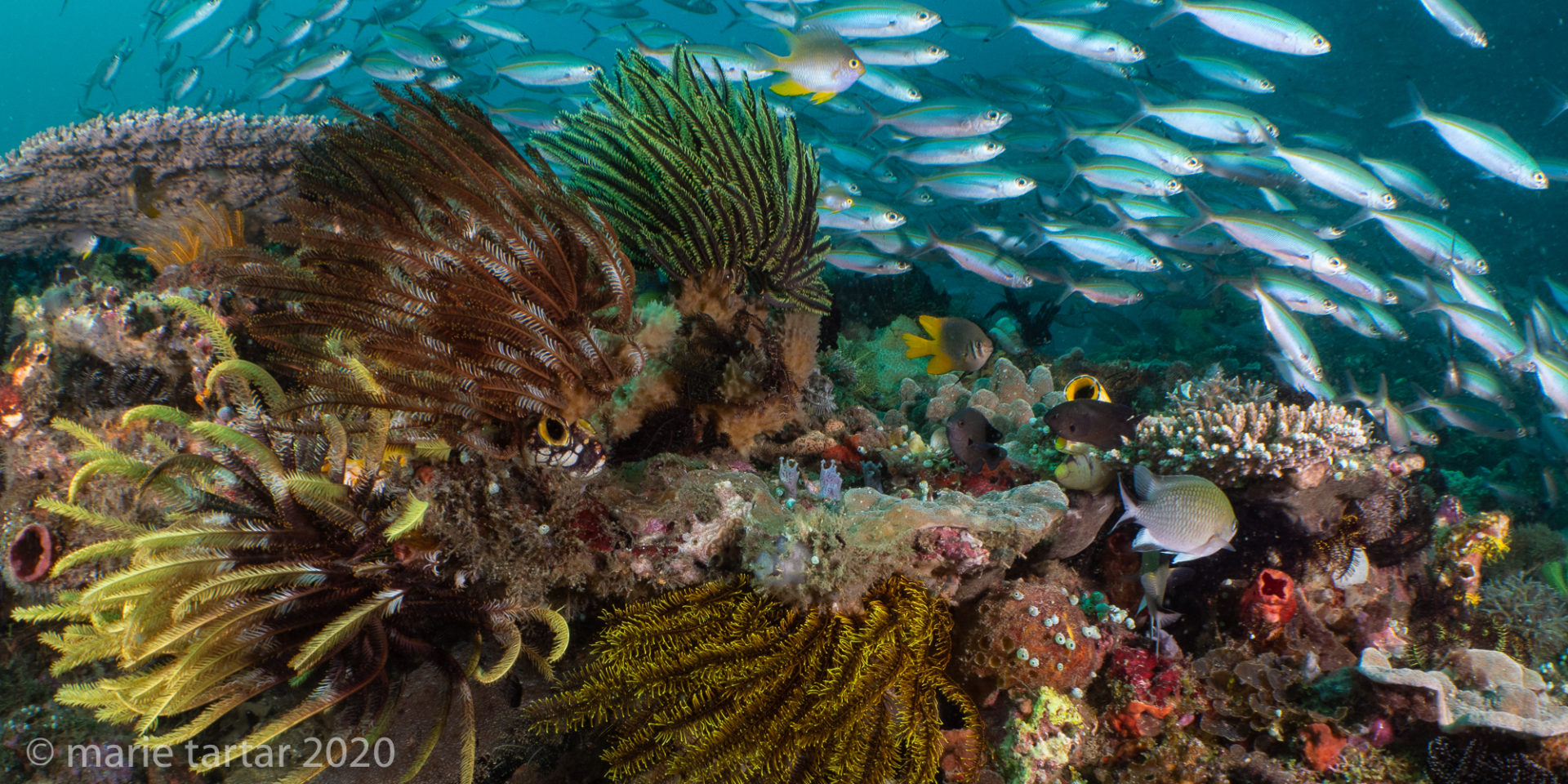
Saturday, January 25-Sunday, January 26, 2020
Given that I was born in 1960, was soon to turn 60 and this trip was a big-birthday-year celebration trip, it seemed an apropo tie-in that this diving trip to Indonesia would make it an even “10” the number of times we’ve travelled to this distant destination. So far and hard to reach, but so rich in color, life and biodiversity, it is our repeat favorite for water temperature, reef health and relative protection from development pressures. Although there has been much change since our first trip to Raja Ampat in 2008, during which we once went a whole week without seeing another boat, plane or village, it is still a relatively pristine tropical idyll.
I spent my 50th birthday underwater in Indonesia, at Lembeh Resort near Sulawesi, on a trip organized by underwater photography giant Chris Newbert, with whom I share a birthday.
So deciding how to mark turning 60 was not a decision to leave to the last minute. Of course that’s hardly possible with dive travel in general, especially on live-aboard boats with limited berths.
Getting away at this time was particularly welcome as the past year had been a pressure-cooker of competing and conflicting demands. Volume was increasing at work without any adjustment in staffing, leading to pressure to read cases that much faster. We were still embroiled in an interminable should-we-or-shouldn’t-we debate about moving forward further with merging with the other Scripps Clinic La Jolla group. Just 2 nights before departure, we had a record long group meeting (until 9:15 pm!) shuttling back and forth over the same pros and cons.
At the same time, there was more scrutiny about taking locums days. I was finding my way trying to balance Mama’s medical and dental care with our own lives. We were now 6 months into the new paradigm of having her living in San Diego and it was still a work in progress, a patchwork of Uber, personally picking her up, accompanying her to doctor’s appointments, making her appointments, paying her bills, supplying her with spending money, fielding texts to her caregivers, many care-related balls in the air at once.
Conversely, Steve’s spinal stenosis was increasingly affecting how far he could walk, without stopping to find a bench, tree or fence to prop up a leg and stretch forward to relieve the neurogenic claudication he’s lived with for years. We both had decided it was probably time for him to schedule the surgery necessary to give his constricted spinal canal more room, so the past month had been further occupied with visits to 3 different spine surgeons, including an orthopedist and 2 neurosurgeons. One of his final tasks before leaving was sending off the paperwork to request a leave of absence to have the surgery after our return.
Some of the busyness of the preceding months was due to an artistic milestone event, my first gallery show, opening 2 weeks before our departure, at The Photographer’s Eye Gallery in Escondido.
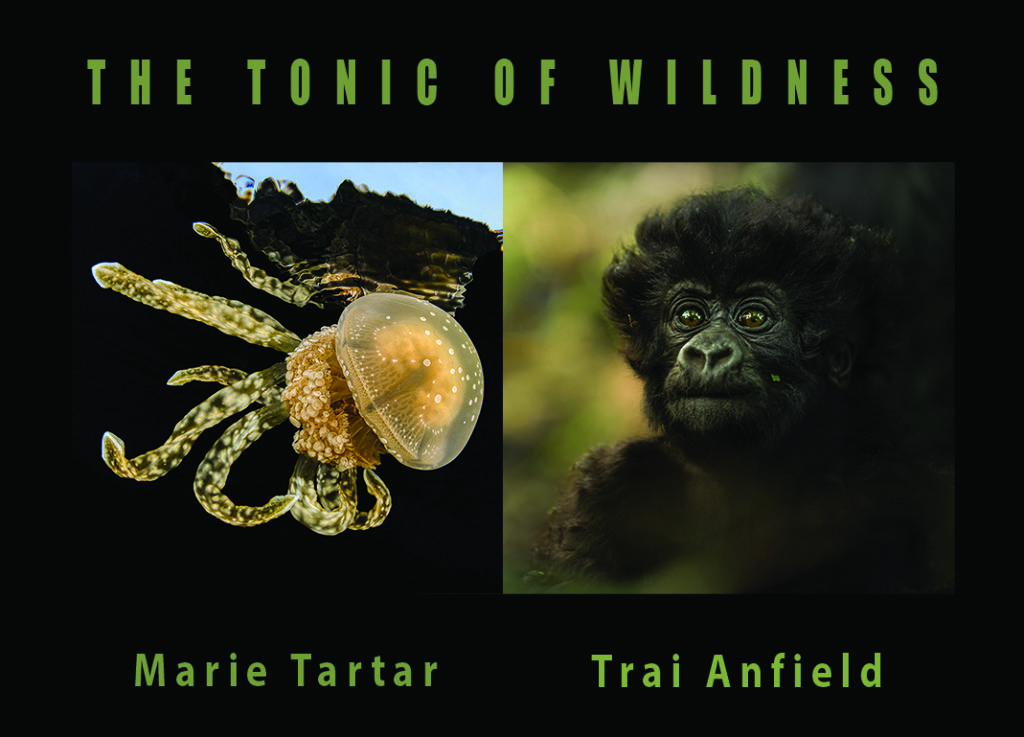
The show’s title derived from a quote from Henry David Thoreau, which ends “We can never have too much nature.”
Even after sending off the selected image files for fabrication Thanksgiving weekend, there was still work to do to prepare for the show: writing an artist’s biography and descriptions of the pieces, delivering them to the gallery, publicizing the show (posting to social media, mailing and passing out postcards).
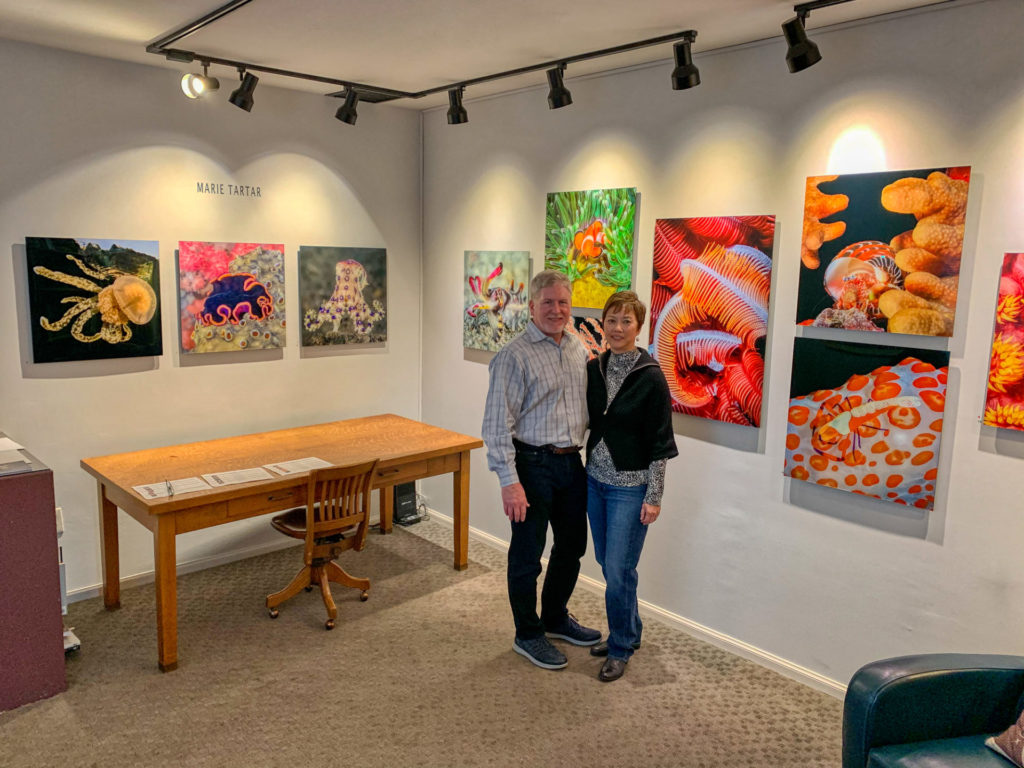
A lot of work went into getting to this moment, with the show hung, just waiting for the opening to start. I couldn’t have done it without supportive Steve at my side.
The opening itself was gratifyingly well attended, as were the walk-throughs I conducted the following weekend, with old and new friends from work and life converging in a marvelous mash-up. The Saturday afternoon walk-through provided a fortuitous opportunity to visit over burgers afterward at nearby Burger Bench with our local family, my sister’s in-laws, soon-to-be-90 Claire, Martha and Alec, offsetting our disappointment that this trip would mean we would miss the celebrations planned in February for Claire’s big birthday. Alec was also responsible for one of my sales, Rings, my image of a blue-ringed octopus, taken on a prior trip with Island Exposures (Tanya Burnett and Kevin Palmer) in Anilao, Philippines (below).
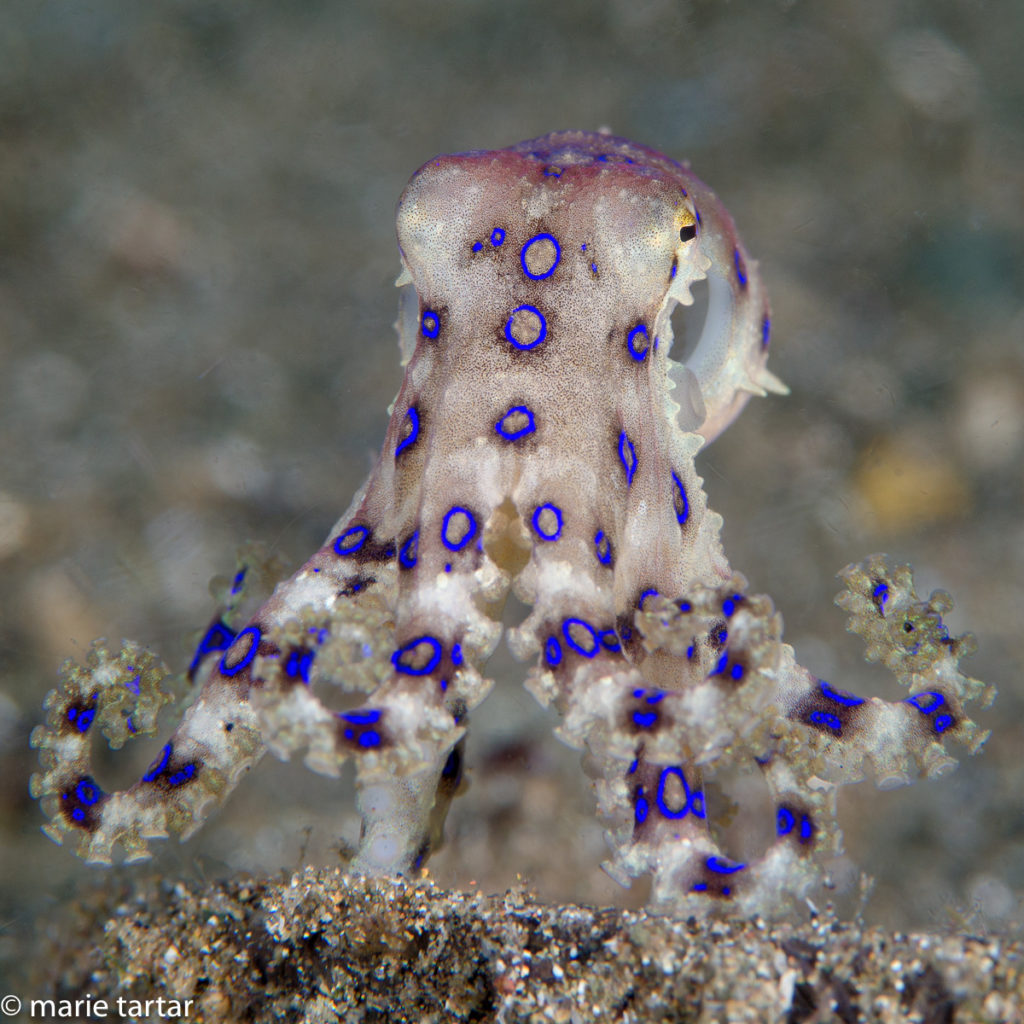
My first time to FIND a blue-ringed octopus; usually they look like amorphous clumps of brown algae UNTIL they start to flash their blue rings in warning.
It was a relief to take refuge in our JAL business class pods, courtesy of hoarding many miles and a lot of repeat visits to the American website. A Japanese comedy called in English Hit Me Anyone One More Time was a comic counterpoint to the impeachment trial of Stump ongoing in the Senate as we left. A despised and despicable Japanese prime minister with bottom-scraping approval ratings is struck in the head by a rock and in losing his memory, is transformed into a caring and conscientious man who is surprised to learn his wife and son can’t stand him and that he’s having an affair, among other revelations.
More hours were passed seeing a second film, Aladdin, with Will Smith as an amusing blue genie in the bottle.
We connected with Kevin in Narita, Tokyo, where we boarded on time. Little did we suspect how non-routine this flight would be.
I watched a 2018 French film I’d missed at the Sedona Film Festival the prior year, Le Retour du Héros, directed by Laurent Tirard and starring Jean Dujardin as Captain Neuville and Mélanie Laurent as Elisabeth. Elisabeth’s sister is engaged to Captain Neuville and despondent when he is called away to war during the Napoleanic era (1809). Elisabeth tries to prop her up by writing letters to her, purported to be from her intended. This ruse is comically threatened when the cad unexpectedly reappears years later.
My viewing of an intense Japanese police thriller, The Witness, was interrupted by the call all traveling doctors dread, for a doctor on board.
After waiting the requisite 30-seconds to see if an internist, surgeon, emergency doctor or other better qualified primary care specialist might respond, Steve and I evaluated a robust Indonesian male about 40 years old, traveling home with his wife from an extended trip to the US, most recently New York. He complained of shortness of breath. His hands felt clammy and he looked sweaty. His pulse was hard to feel. Fortunately, there was some monitoring equipment on board. The wrist blood pressure cuff, when we could get it to read him, suggested he was very hypertensive. He was being treated for hypertension and had taken his medication on boarding for the return journey but not since. I tested the cuff on myself to see if it was to be believed. Based on what the cuff said MY blood pressure was, I suspect he was not as hypertensive as suggested.
We got more useful information when a pulse oximeter was eventually located in the medical kit and resuscitated with a fresh battery. He was tachycardic, with a heartrate of 133. Most disturbing was his oxygenation, in the 80s. He was already on oxygen when we arrived on the scene.
Could he have atrial fibrillation with a rapid ventricular response? Chest leads were located, placed and hooked up-it looked like sinus rhythm, so no.
We questioned him and his partner, a young woman who repeatedly mopped his forehead of the drops of sweat that formed over and over. He had had a sore throat in New York, but that was attributed to the cold.
We looked through the kit of medications available on board. There was one antibiotic. We suspected pulmonary embolism, but on the chance he had pneumonia, gave him the first dose of the antibiotic.
I suggested to the crew that he be moved to business class. He and his partner were in the last row, and we had rapidly filled the empty seats in the row of 4 with monitoring equipment. There were empty seats in business and I thought he might be more comfortable there where we could more easily move around and monitor him. When he said he didn’t think he could walk up to the front of the plane, I really became worried. Although he hadn’t destabilized, he appeared to be working harder to breath, with his neck muscles standing out and his heart rate trending upward into the 140s. We recommended diverting the plane to Manila, as we were still 4.5 hours from Jakarta. As we later learned, this was not an overreaction, as the poor man apparently died in Manila. I learned this from the head flight attendant when she came by later with a JAL thank you gift bag, filled with two red-wrapped bundles. I didn’t unwrap them until the following afternoon, after we collapsed at the FM7 airport hotel in Jakarta at 4 am, after hours on the ground in Manila, refueling and having the plane boarded by health workers in protective suits and masks, taking the temperatures of the passengers. What was in the bag? JAL chocolates and instant soba and udon noodles. (Back home, we received a thank you letter from JAL, asking for our address to send us a gift. They also gave us a lead on recovering Steve’s noise cancellation headphones and the other items he left on the plane in Narita.)
Monday, January 27, 2020
After our tumultuous night, we caught up on sleep in the afternoon, capped off by a restorative massage for me in the evening.
We did venture into Jakarta to Emporium Mall to replace Steve’s laptop charger and cables, left behind in his seat pocket in Tokyo. Our departure wasn’t until after midnight. We met up with Tanya and Kevin in the airport, as well David and Kimberly from Seattle.
Tuesday, January 28, 2020
With the 2 hour time change, 4 hour flight from Jakarta and middle of the night departure, it was early morning when we arrived to West Papua in Sorong, or as Tanya dubbed it SoWrong. Dayrooms had been arranged for us at the Swiss-Belhotel.
After breakfast, I made an excursion into town with Tanya and Gwen in search of penis gourds, jewelry and other treasures. We did find some bracelets of interest, as well as checked out an outpost of Misool Eco Resort, the Misool Filling Station, a coffee and smoothie bar.
By mid-afternoon, we were on the boat en route to Papua Paradise, a 1.5 hour transfer.
We were greeted with a lively burst of music.
I loved the resort, a line of thatch-roofed water bungalows on either side of a dock, with an open air restaurant and lounge. A lovely spa was at one end. The dive operation, Gangga Divers, was well organized and by the end of the evening, our wetsuits were hanging at the dock, our gear was stowed in bins, our cameras were assembled and we were ready to dive!
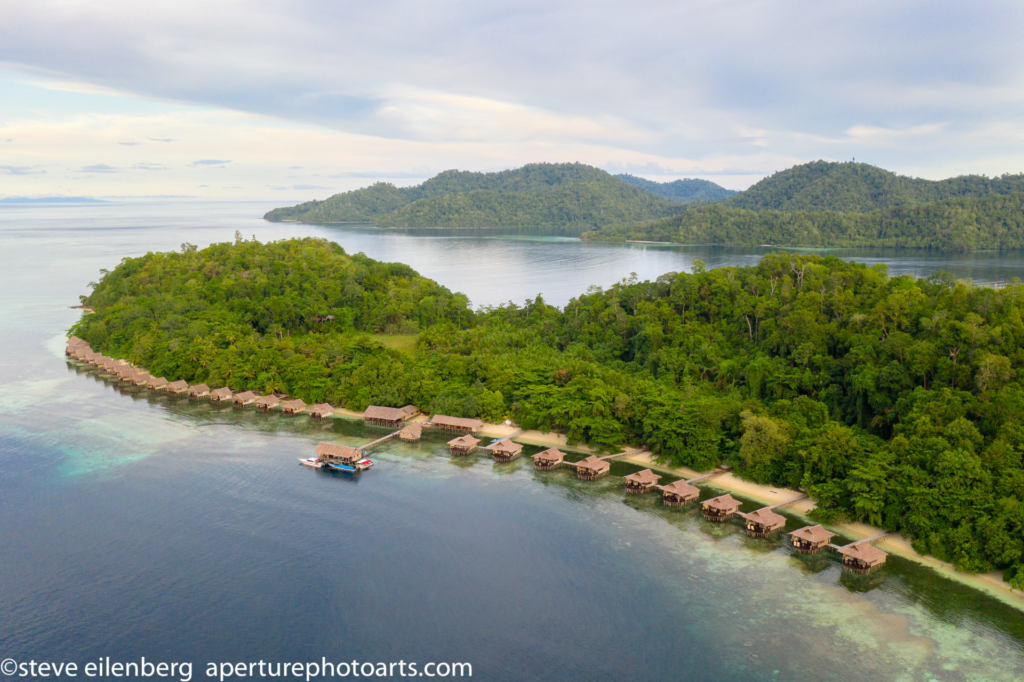
Papua Paradise Eco-resort is well named-I loved this retreat, just the right mix of comfort, rustic elegance and not ridiculously over-the-top luxury.
The subsequent days were blissfully passed in a blur of eating, diving and downloading, generally starting with wake-up at 6 am, breakfast at 7 am, suiting up at 7:45 am at the dock and heading off by boat at 8 am for 2 morning dives. We mostly shot wide angle in the mornings, returning to the resort for lunch and to change our rigs out to macro for the afternoon and evening, and heading out again at 2 pm for an afternoon dive, followed either by a dusk mandarin fish dive or a night dive. The camera room was air conditioned, small but adequate and the guides toted our rigs back and forth from the dock as needed. We eventually decided working on the cameras in the camera room rather than in the more distant bungalows was more efficient than lugging gear back and forth.
Wednesday, January 29, 2020
First day of diving, Papua Paradise
Dive 1: Sauyador Reef (44 minutes 83 feet)
We were paired with Chris and Gwen with Lucky as our dive master. For wide angle subjects, we didn’t have long to wait: two wobbegong carpet sharks, resting placidly on the sand, easily approachable.
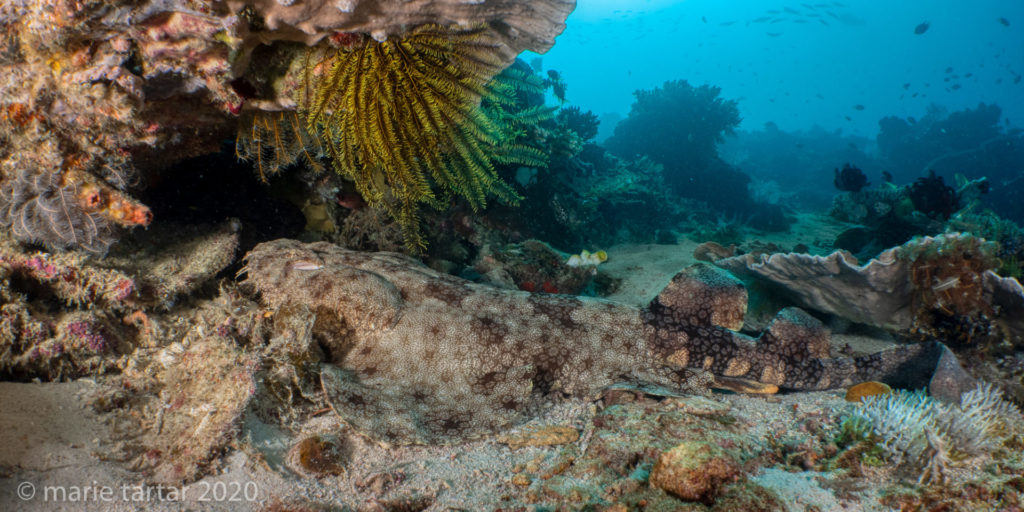
Off to a great start, a wobbegong carpet shark resting on sand, sighted within minutes of entering the water.

Wobbegong sharks are well camouflaged, even resting on the sand; I’ve seen experienced divers swim right over a 6 foot wobbie without seeing it.
2: Manta wai (64 minutes 43 feet)
At this Manta cleaning station, we had close passes at the beginning, then a long wait for mantas until Steve and I were last in with Tanya, when 2 large white mantas streamed over the reef.

Manta rays come into cleaning stations for preventive maintenance, namely to be rid of pesky parasites. The cleaner fishes gain a meal in providing this service.
Of course, there were other delights to be seen, with hard coral clumps over which innumerable fish danced. David and Kimberly joined us after a Nitrox training dive. Experience a close manta pass here.
Dive 3: Pulau Yum (73 minutes 63 feet)
Just Tanya, Steve and me with Lucky; my first dive with 30 mm macro lens and new port. The Olympus’ battery died on Steve so he spotted, with the highlights being a pair of tiny cuttlefish, a splashy-coated frogfish and the tiny, elusive, “groovy” picturesque damselfish (a mandarin fish relative).
Dive 4: House reef 2, night (60 minutes 54 feet)
Yulens found a blue-ringed octopus which promptly disappeared into the rubble. As he probed with his pointer, a red spiky juvenile electric clam made an appearance. Another find was an impossibly tiny and insubstantial Halimeda ghost pipefish.
Thursday, January 30, 2020
What a day! We made an all-day, 3-tank excursion to Dampier Strait, with lunch at Arborek. David and Kimberly were paired with Chris and Gwen. Kimberly subsequently dubbed their group the “Special Eds”. Steve and I were paired with Tanya and Kevin with Yulens as our guide for the rest of our stay.
Dive 1: Sawandarek (58 minutes, 83 feet)
Posing sweetlips under the jetty at the start of the dive would have been enough to make this dive for me. But there was so much more: glassy sweepers, a large wobbegong on a giant round coral pad and turtles.
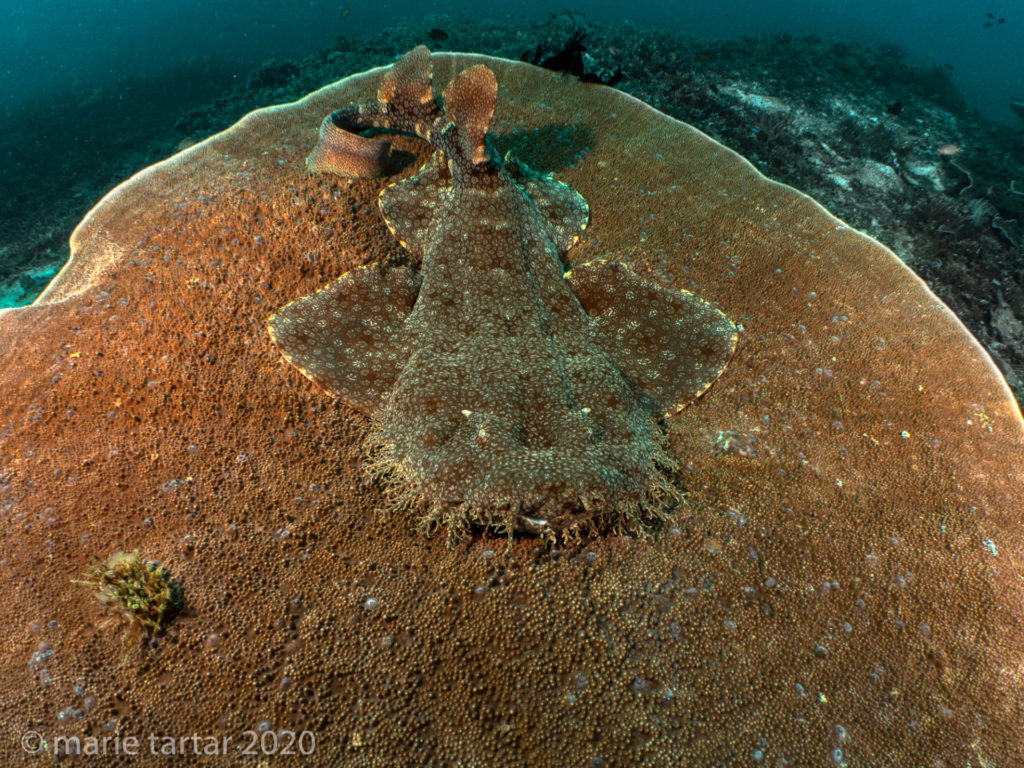
A wobbegong carpet shark stretches out on a large table coral pad in northern Raja Ampat, Indonesia.
Dive 2: Manta Ridge (82 minutes, 43 feet)
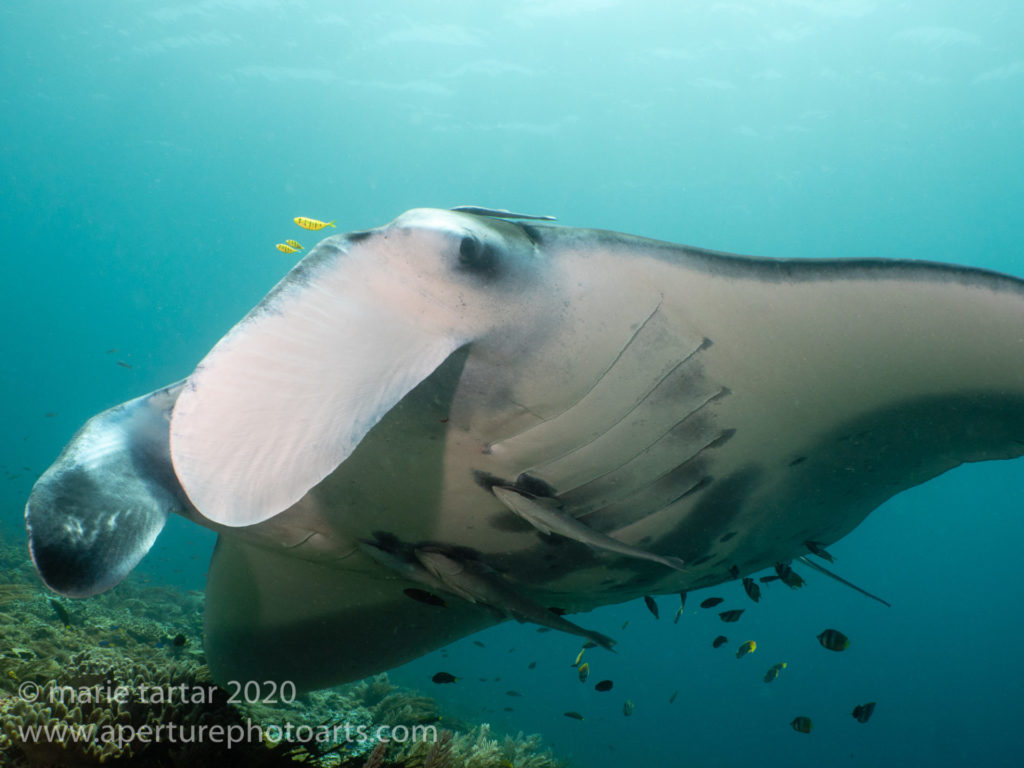
A manta ray and its entourage (yellow pilot fish at its head and remoras on its belly) peers closely at me at Manta Ridge, Raja Ampat, Indonesia.
A long coral covered ridge in a strong current, with mantas hovering at the top, lined with divers, so many that Tanya looked inclined to abort the dive right then. Fortunately Yulens prevailed and moved us down the ridge, where there were fewer people to contend with and eventually, mantas. The final 10 minutes were epic, with mantas virtually stopping on our heads. Reef hooks had been distributed and were employed. Experience it vicariously here, here and here.
Dive 3: Arborek Jetty (61 minutes, 61 feet)
A manta surprised Tanya emerging from under a ledge, while a turtle I was stalking surprised Steve by appearing at his elbow.
My day was rounded out by a massage with Ayu from Bali, Spa in Paradise indeed.
Friday, January 31, 2020 (search and recovery day)
Dive 1: Pulau dua (58 minutes, 75 feet)
Dive 2: Fish Heaven (65 minutes, 66 feet)
Over a series of dives we discovered that Kevin brakes for sweetlips, the more the better and we fell prey to this frenzy as well.

Pennant coralfish (aka longfin bannerfish, pennant bannerfish; (Heniochus acuminatus)) jostle for position with Ribbon Sweetlips (Plectorhinchus polytaenia) in the group photo.
Steve appeared over the gunnel of the boat as I was waiting in the water with Tanya and Kevin to ascend the ladder back into boat.
“I think my dive computer fell in when I took off my BCD! ”
Tanya and Kevin sprang into action, re-descending and starting a spiraling search pattern below. Kevin emerged with the wrist-mount computer in pieces, missing the pin securing the strap to the computer itself. It had fallen upside down, with the buckle pieces a short distance away.
Dive 3: Gadis (73 minutes, 54 feet)
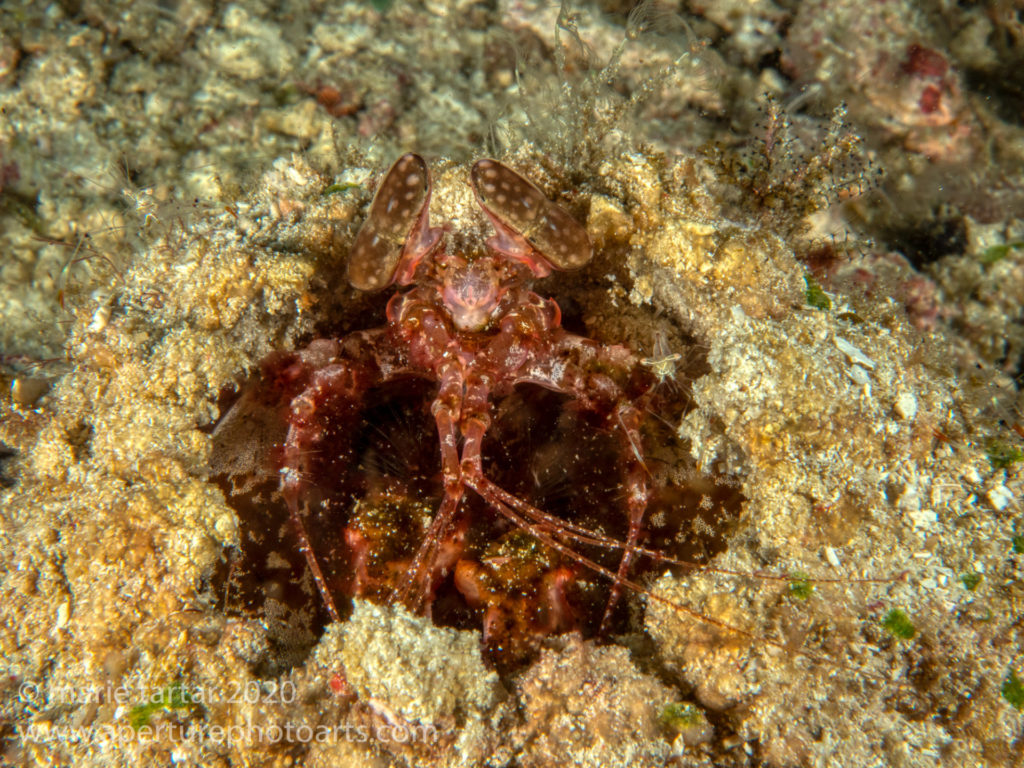
Mantis shrimp, peering out from its sand tunnel home, is a formidable creature, hunting and impaling its prey with a specialized spearing adapted forelimb. Bonus for the sharp-eyed: there are 2 translucent shrimp in this image as well.
Mantis shrimp and devil scorpionfish were among the feature creatures of this afternoon dive.
Dive 4: Gadis Point (night) (66 minutes, 52 feet)
I was to have my own occasion to do a recovery later the same day, but at night. I realized shortly after entering the water that I was missing my pointer stick. My lanyard wasn’t tight enough and it had apparently fallen as I hit the water. I wasn’t too optimistic about finding it at night but thought it worth a try. I was near a larger bommie landmark at depth that we had dove in the afternoon. I retraced my swim down, starting up the slope, shining my light widely around. About 15 feet away, I saw a strange hard-edge glimmer of my stick, which has a right-angle bend in it as a handle. Sadly, I was to lose it again later in the trip, again on entry. I saw it descend but was waiting for my camera to be handed down to me so couldn’t immediately give chase.
A tiny, microscopic really, bobtail squid in the sand, looked like a darker speck of coral rubble, a tiny brown bubble.
Saturday, February 1, 2020
Dive 1: Wai West (57 minutes, 81 feet)
At the current corner, not too much was going on. From there, we did a drift dive over a nice hard coral garden.
Dive 2: Manta wai (67 minutes, 40 feet)
Our return to the manta cleaning station, consisting of several bommies in white sand, produced some action, seen through terrible visibility. A blue-spotted stingray came cruising through.
Dive 3: Birie end (afternoon) (69 minutes, 53 feet)
On this muck dive, I spent nearly the entire dive on a microcosm of a bommie, with glassy sweepers, anemones and clownfish, pipefish, a universe in miniature.
Kelly and Wes arrived on the afternoon boat.
Dive 4: Pulau yum (dusk dive, 5:15 pm) (61 minutes, 22 feet)
Yet another unsuccessful attempt to document mandarin fish mating. These tiny fish creep and skulk around broken coral rubble in 10 feet of water. I was focused intently on a larger, presumably male, mandarin fish when Steve appeared at my side, gesturing behind him, appearing like he was having a seizure. He was completely unaware that his message did not come across to me despite his eloquent signing; apparently another diver had fallen onto him, twice, destroying the mandarin fish “nest” he was haunting and completely silting up his stake-out station.
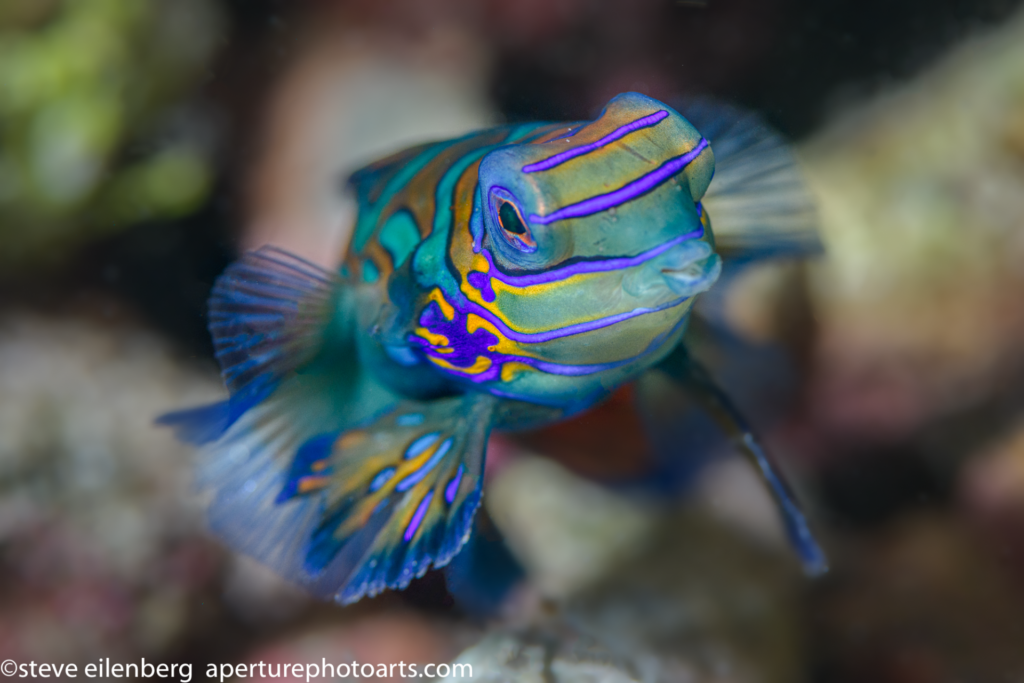
The mandarinfish is named for its glorious coloration, recalling the sumpteous robes of Chinese nobility.
What I knew was he reacted angrily when I took a test shot of a single mandarin fish. Yes, we’d been warned that the little fish spook easily but it wasn’t as important to me to capture them mating as it was to have a nice portrait, properly exposed, especially since my earlier attempt, with the colorful creature down in its hidey hole, was woefully underexposed.
Sunday, February 2, 2020
Tanya sat out this dive day due to a scratchy throat.
Kevin, Steve and I dove with Yulens; Kelly and Wes and Bill and Donna went with Cornelius and the Special Ed group (David and Kimberly, Gwen and Chris) had their own boat with Lucky.
Dive 1: Yenkarom (67 minutes, 70 feet)
Dive 2: Gadis point (71 minutes, 65 feet)
It was good I was shooting macro, as the visibility was terrible, with tons of particulates in water. We spent our surface interval at the house reef 2 jetty.
Dive 3: Yenkarom (62 minutes, 60 feet)
We changed to wide angle at lunch to revisit a bommie with multiple lion fish and glassy sweepers concealing a wobbegong shark which had been the highlight of our morning macro dives.

I like Steve’s depiction of this wobbegong shark and its aurora of glassy sweepers even better! (Raja Ampat, Indonesia)
Incredible fish streams poured continuously over reef.
I took the evening off from diving to take the hornbill cruise with Evan as my guide. The hornbills migrate from one island to another every evening, their wings pulsing in a distinctive whooshing. We saw some dolphins briefly on the way and a white cockatoo could be seen high in the lush green forest.
Monday, February 3, 2020
3 tank excursion
Dive 1: Cape Kri (50 minutes, 120 feet)
Kevin suddenly swimming down into the deep was our first clue we had reached a huge sweetlips aggregation, so large that from a distance, it resembled a bommie. It was deep, at 120 feet.
Big-eyed trevally (jacks) were schooling in the shallows.
Dive 2: Lau Lau Reef (53 minutes, 84 feet)
For most of this dive, we chased huge schools of snappers and barracudas .
Dive 3: Mioskon (67 minutes, 52 feet)
Soft corals and glassy sweepers were the theme of this dive.
Dive 4: Pulau Yum (65 minutes, 14 feet)
Try, try again. Steve nailed the mandarin fish mating shot this evening. Kevin called me over to his station where I actually finally witnessed a mating event, as the pair rose deliberately, in spurts, a few inches above the rubble. I didn’t realize his camera battery had shut down until later. Having a better feel for the rhythm of the event, I was able to grab a few shots of an amorous pair after Steve started up from his still active station, just as the dive guides were signally time to ascend.

Proof that good things come to those that wait…and wait…and wait some more. In my book, THE most frustrating underwater subject, a mating mandarin fish pair, Pulau Yum, Raja Ampat, Indonesia. While this is the best I have ever managed with this subject, Steve really got the shot (below).
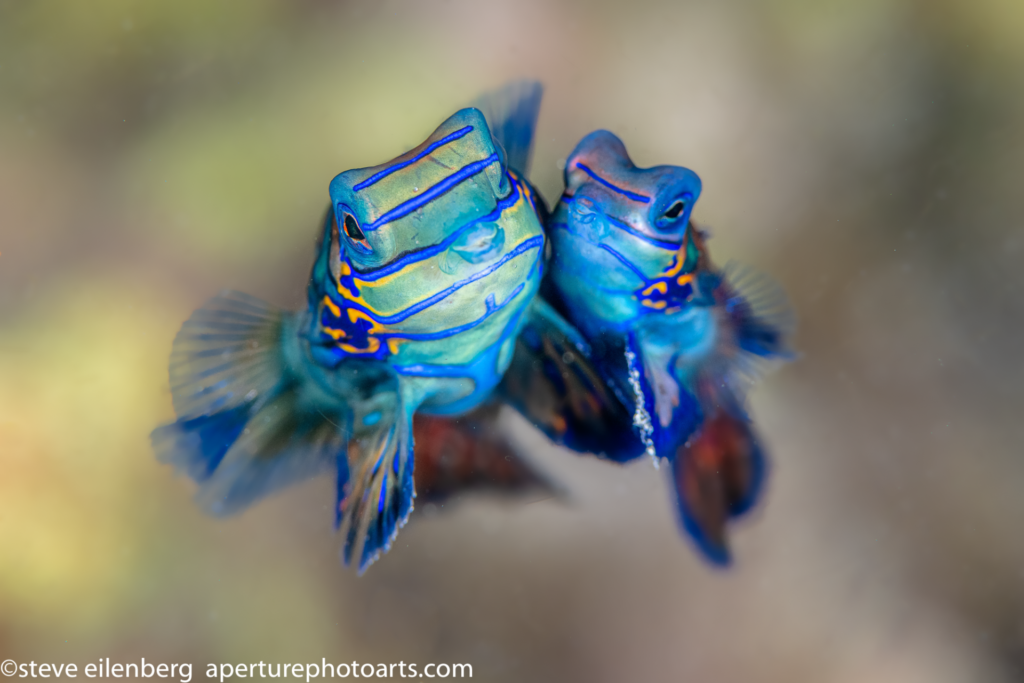
Beautiful! The male is the larger, on the left, with the smaller female on the right. The male may mate with more than one female during the dusk seduction period.

One second later: the mandarin fish couple rise cheek to cheek in the water column and then bam! they separate, leaving their gametes in the water.
Tuesday, February 4, 2020
Transfer to Damai
Kelly had skipped a dive the prior day to do a boat outing in search of the rare, elusive and near threatened Wilson’s bird of paradise (BoP). Even though I’m not much of a birder, seeing this incredibly festooned bird on David Attenborough’s BBC nature shows and being so close to its limited range, seemed too good an opportunity to pass up. As we were transferring to Damai on this day and no diving was planned for us, I didn’t even have to make the difficult choice to skip a dive in order to go.
I enjoyed the excursion enough I wrote up the experience for Photofocus. Never have I worked so hard for such mediocre photos, but it was a tough shooting situation and and an interesting challenge, drawing on everything I know about photography.
We were back in time for breakfast and an indulgent morning of treatments, a Javanese scrub, massage and facial. With minutes to go before my appointments, I managed to finalize our film selections for the Sedona International Film Festival. It had taken 3 consecutive evenings to even read through the film descriptions, the Internet connection was so thready, so it was a great relief to have our film selections completed before boarding the boat for the second half of this tropical dive excursion.
-Marie

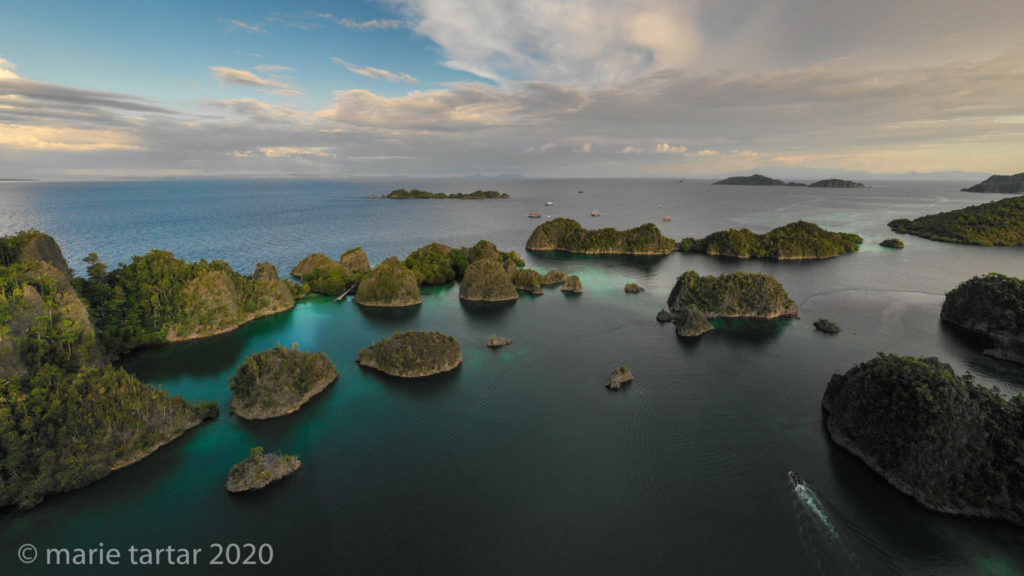
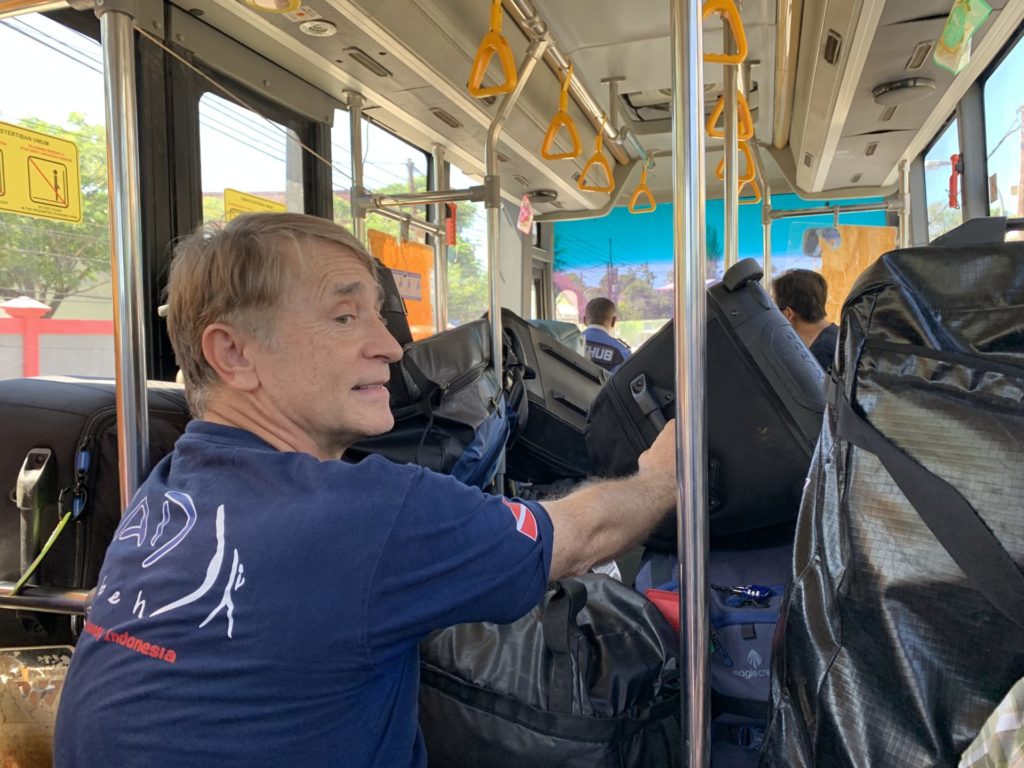
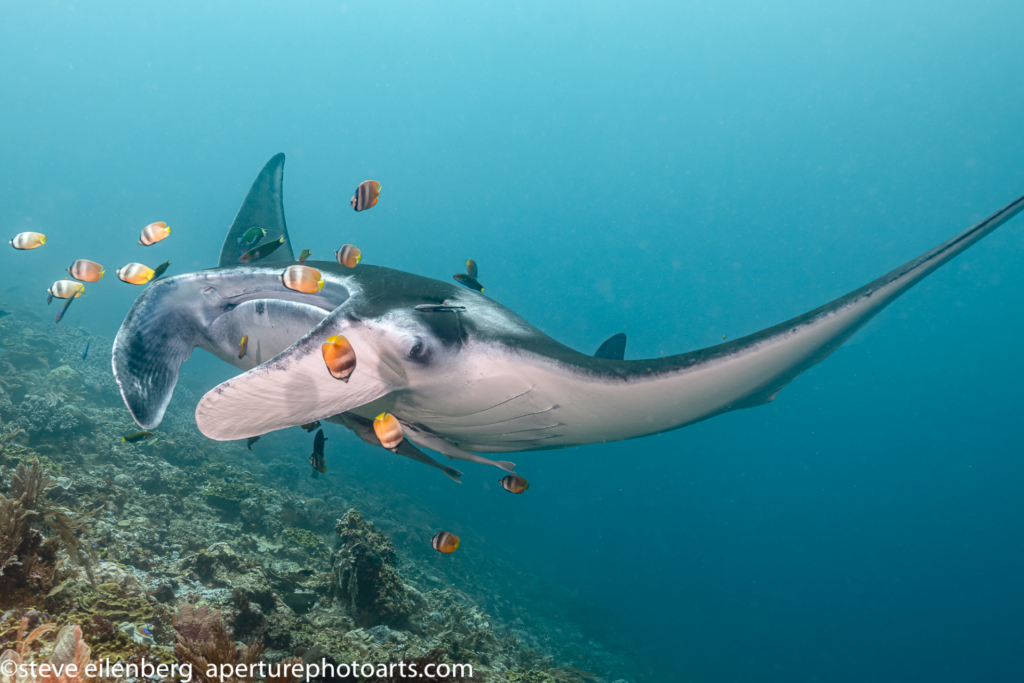
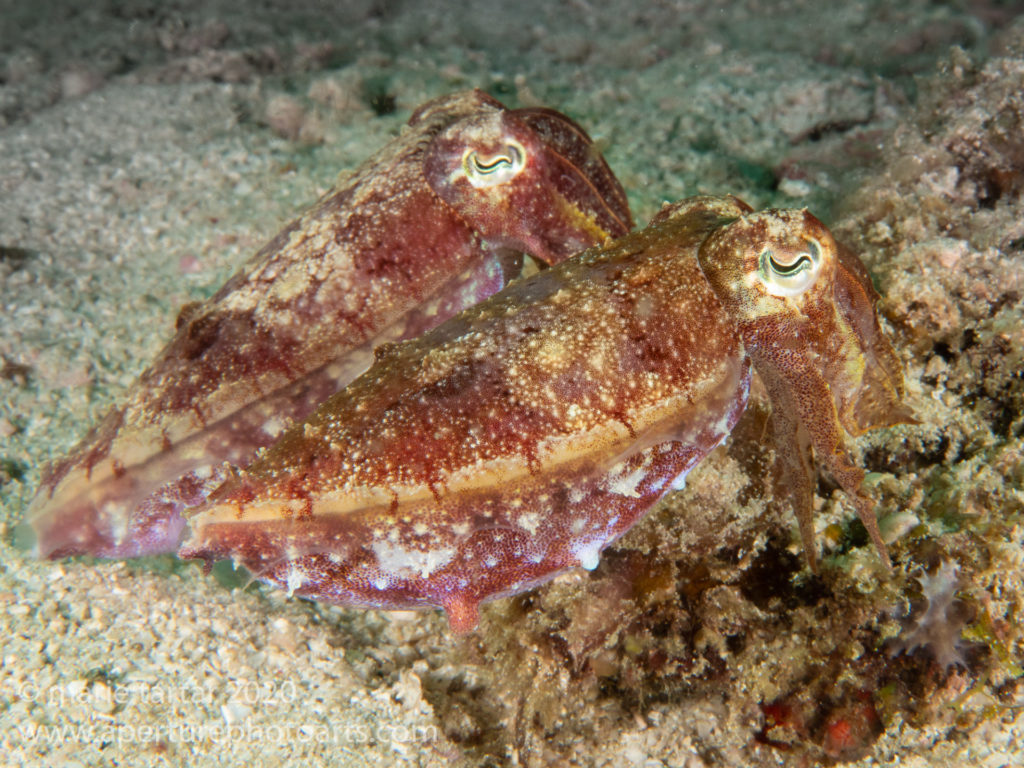
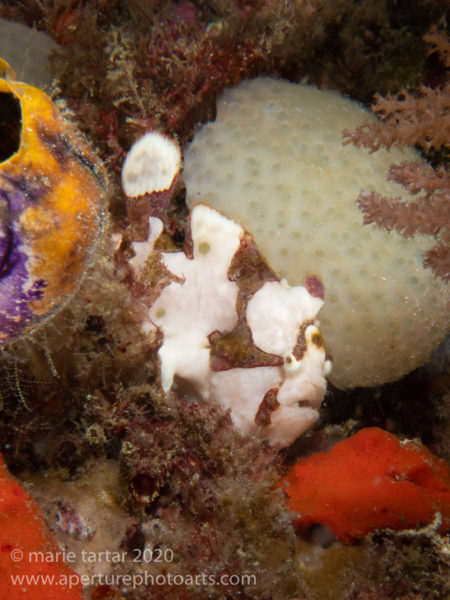
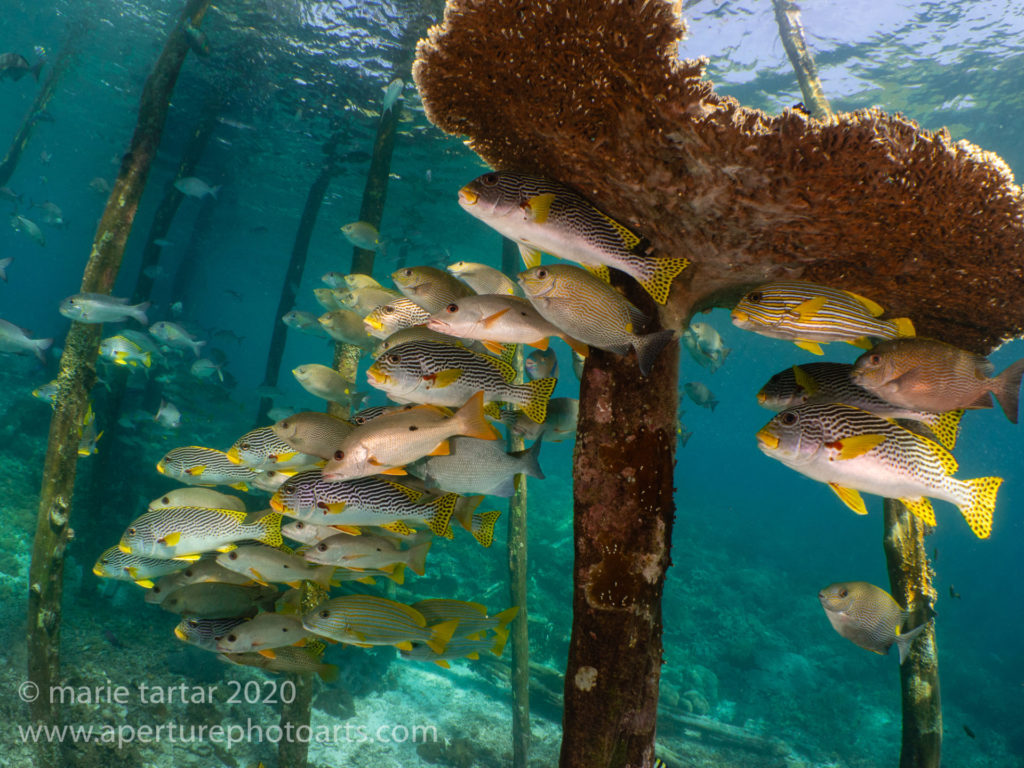
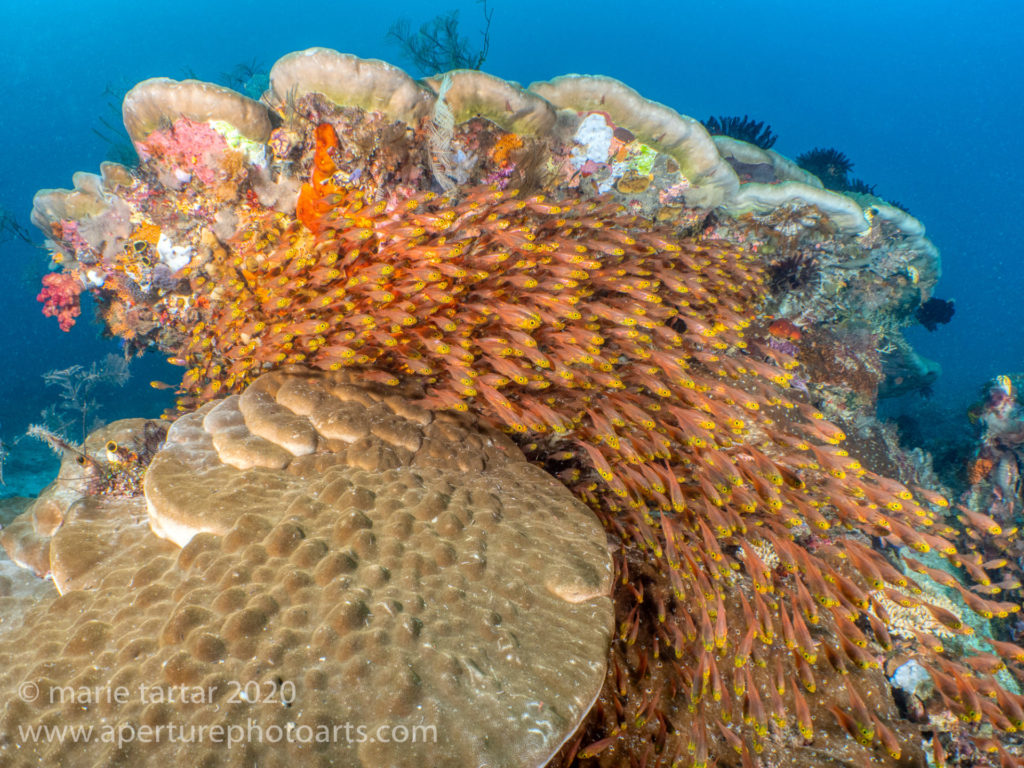



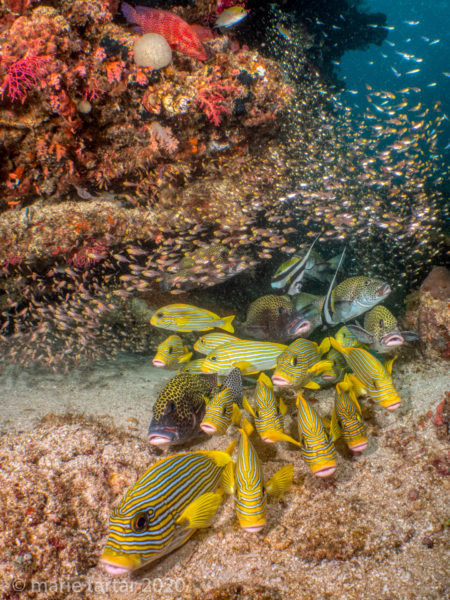
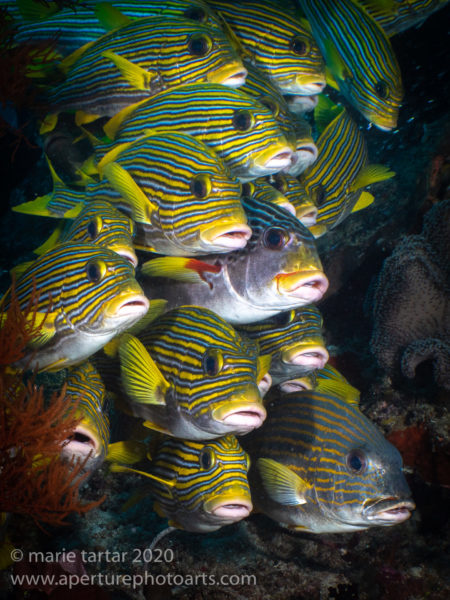
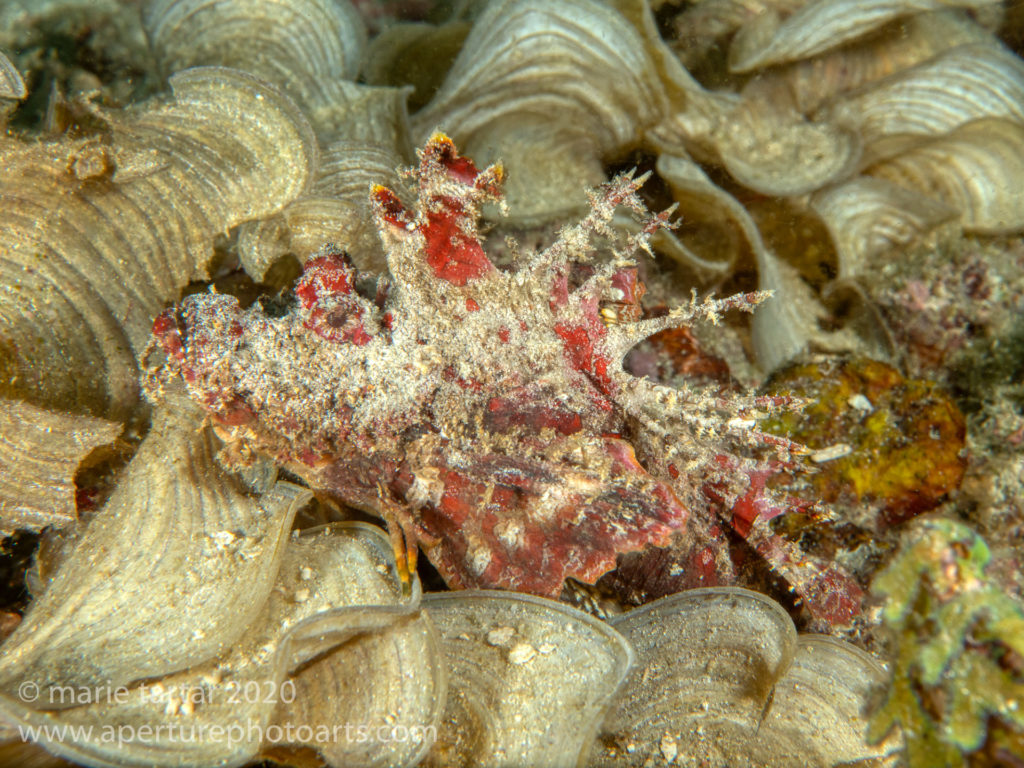
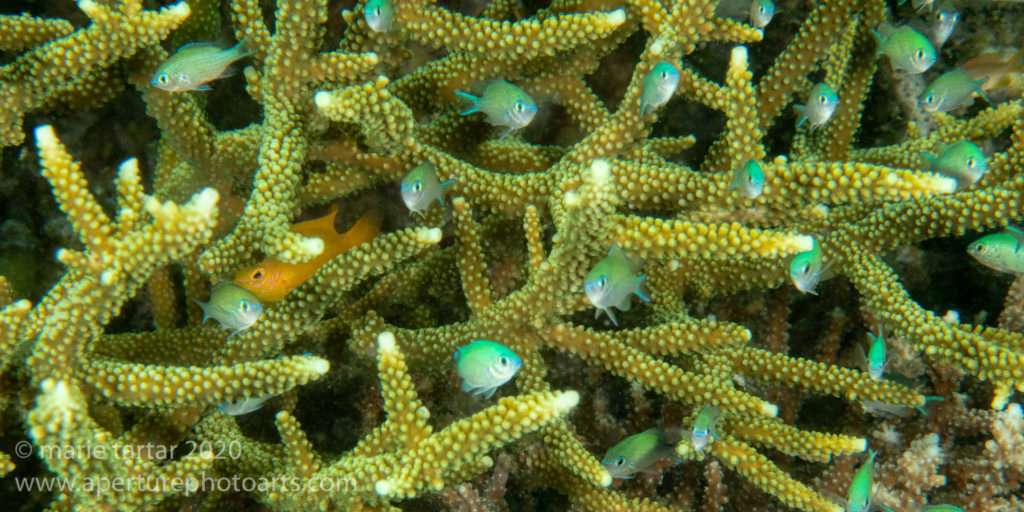
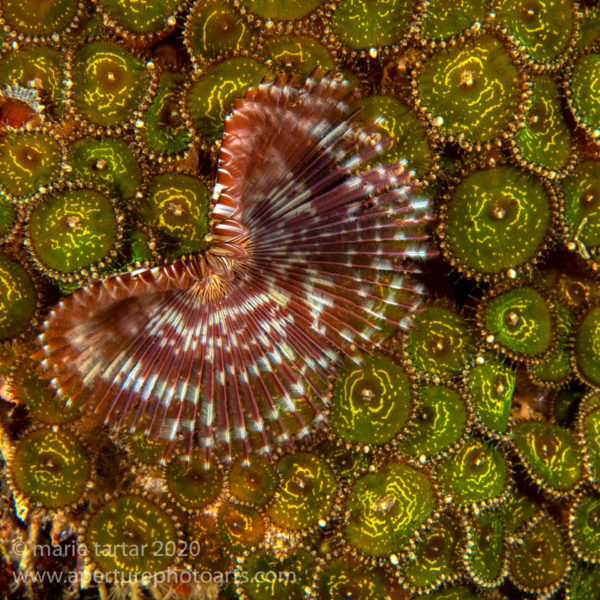
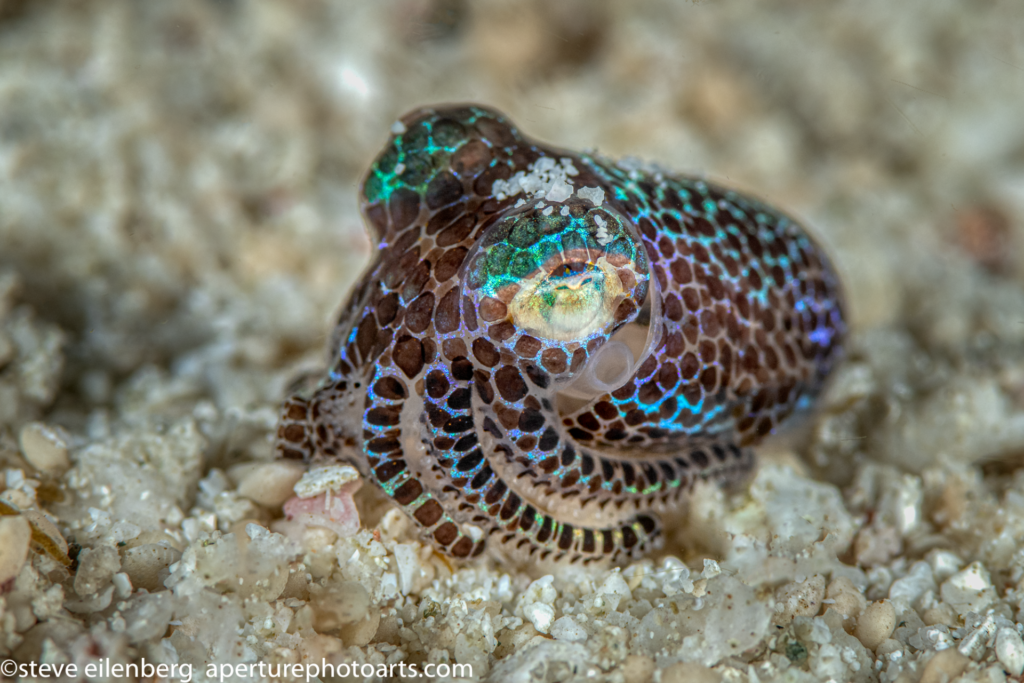
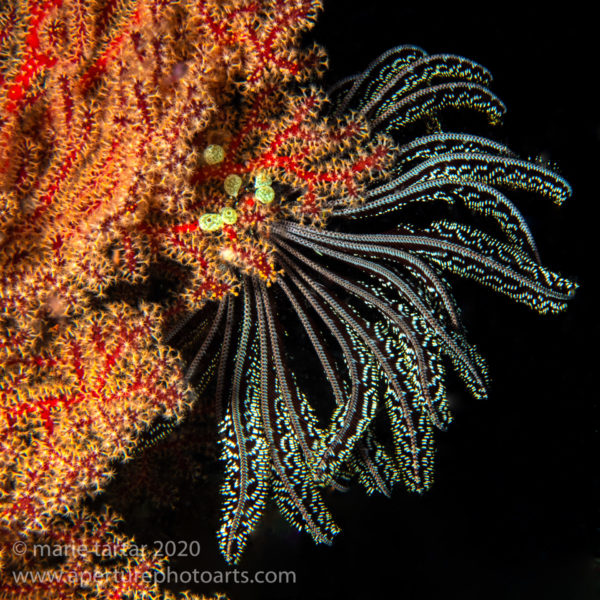

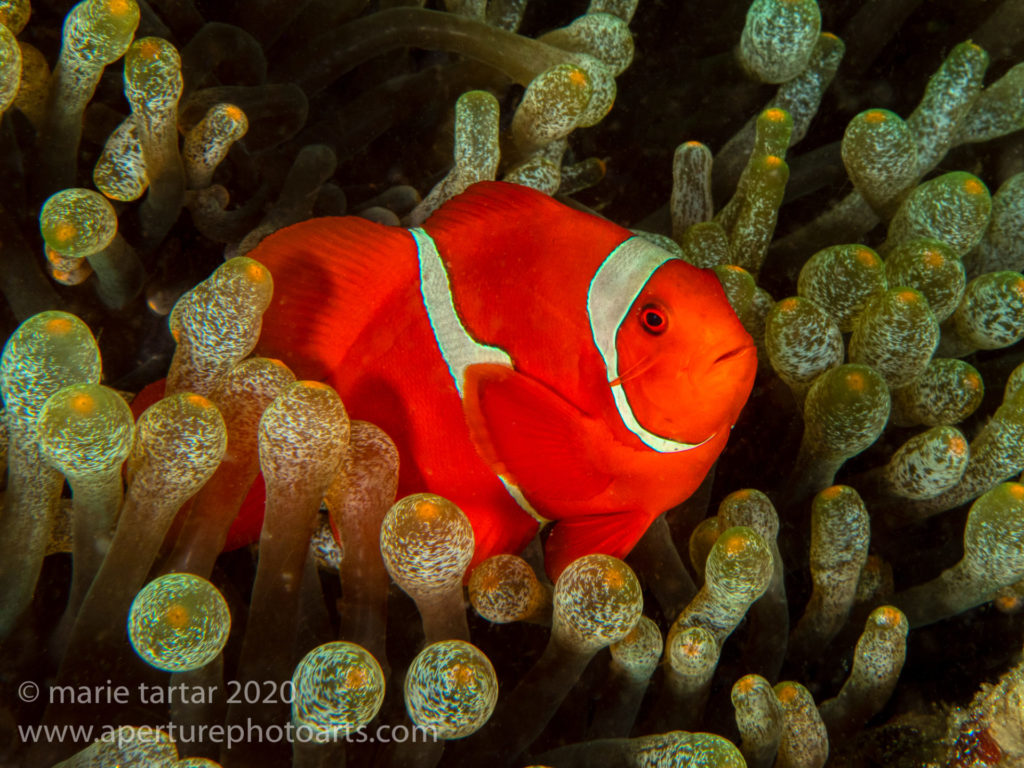


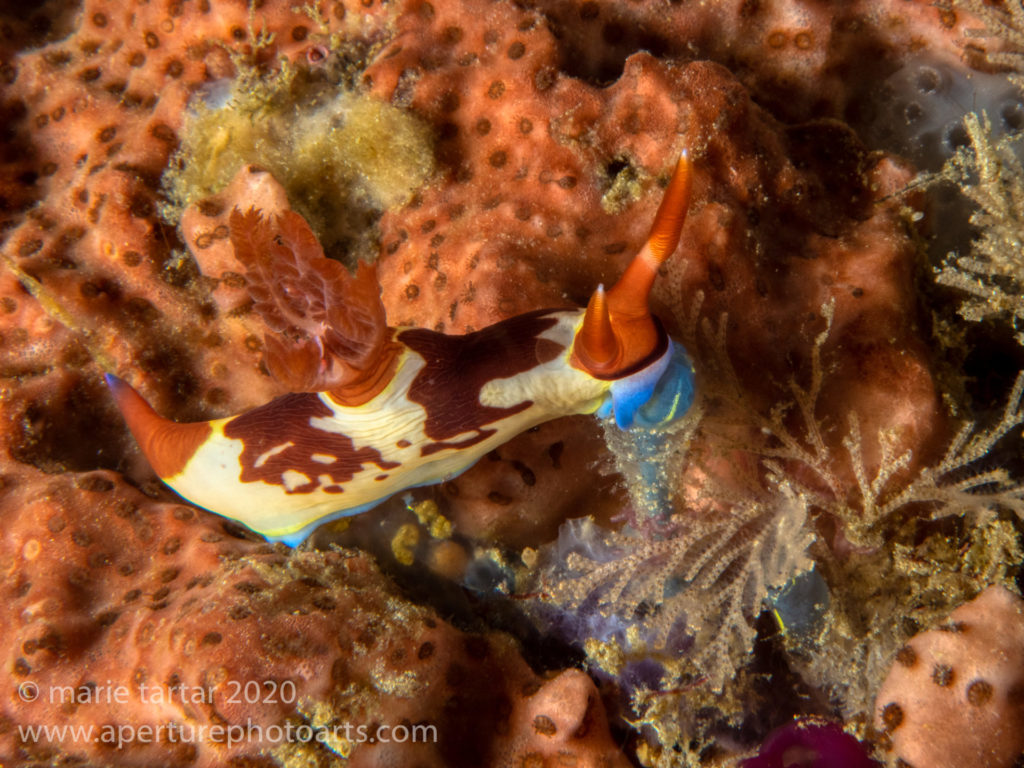
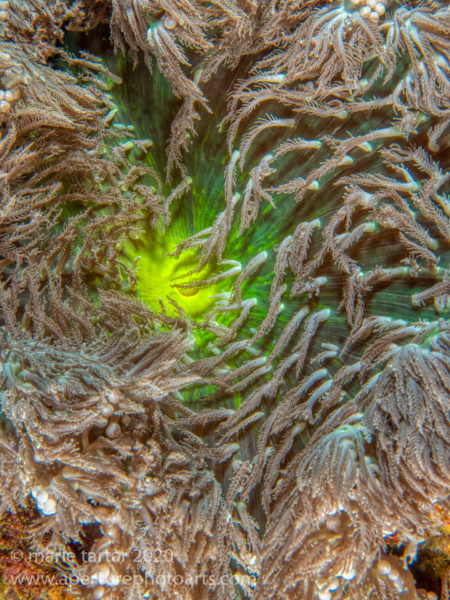

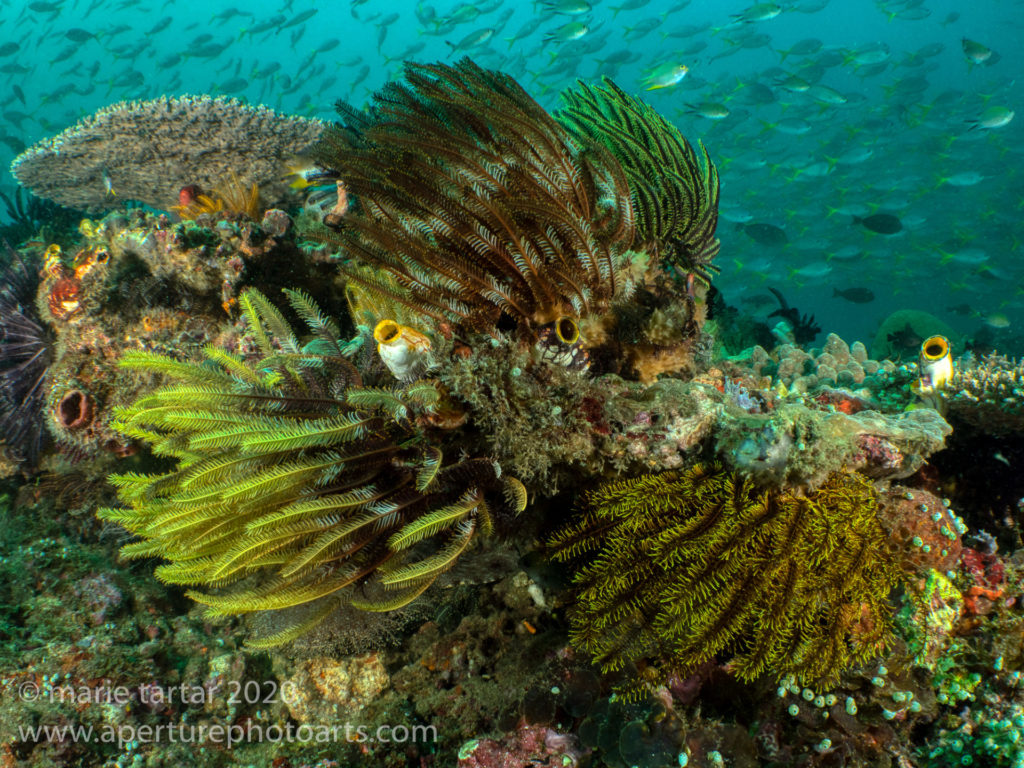

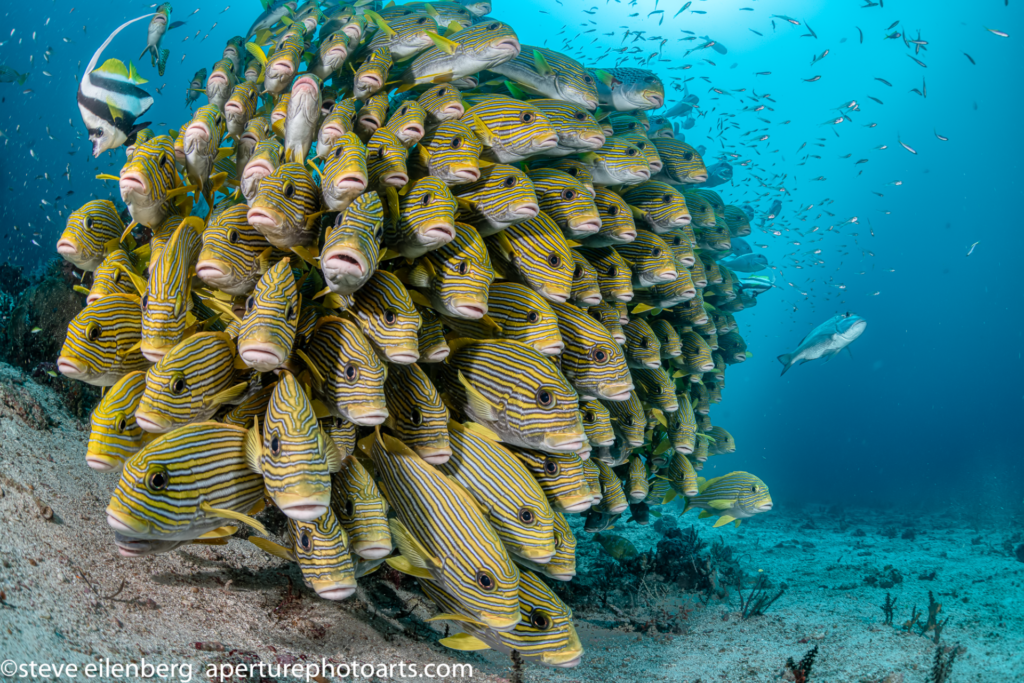
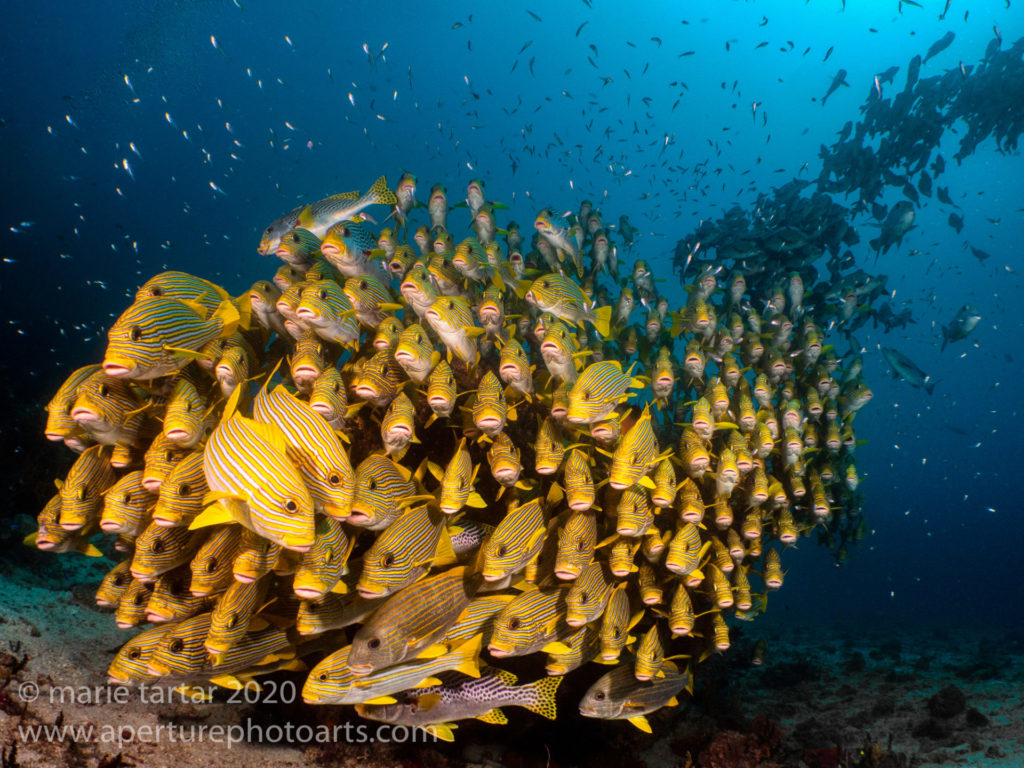
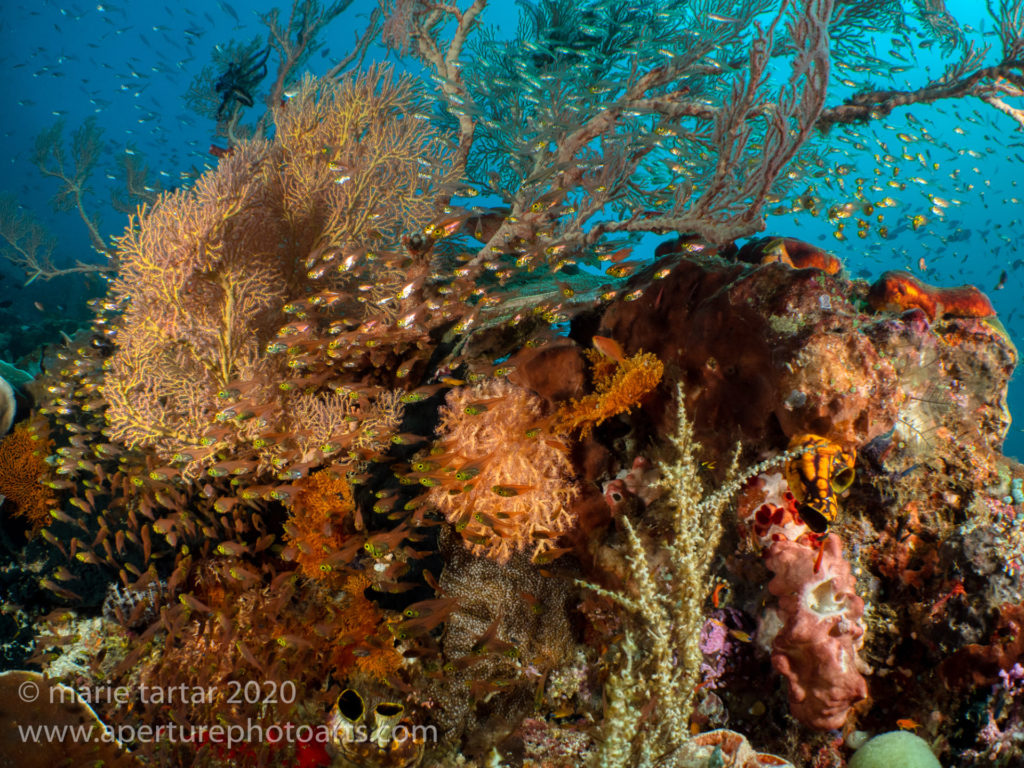
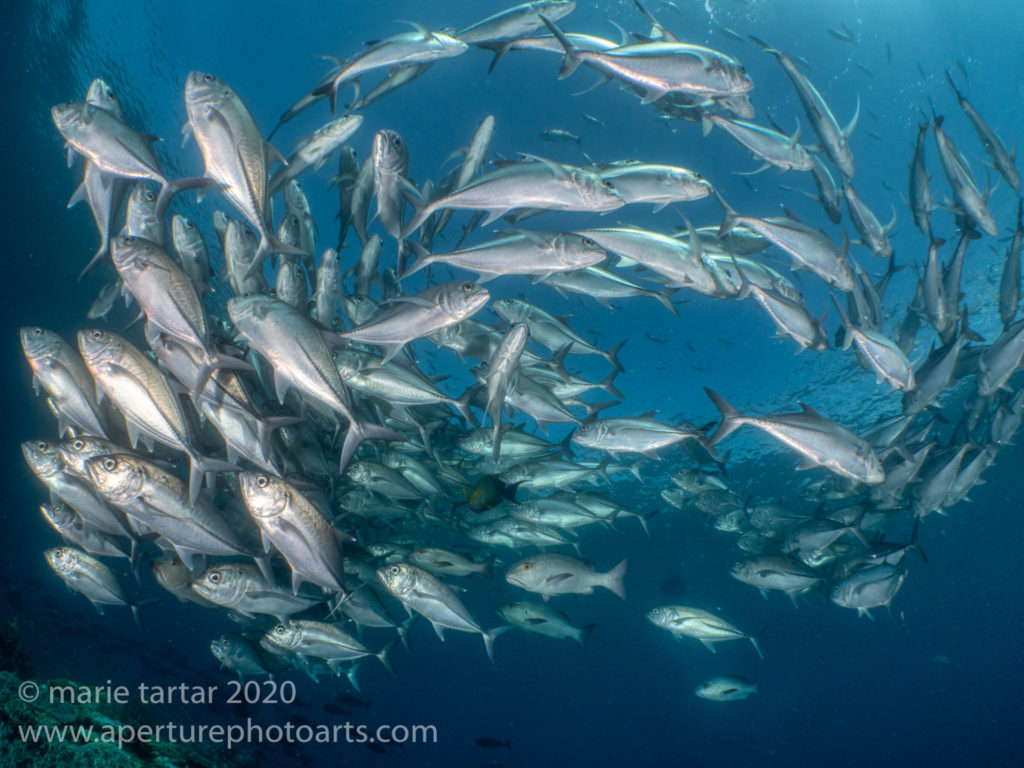
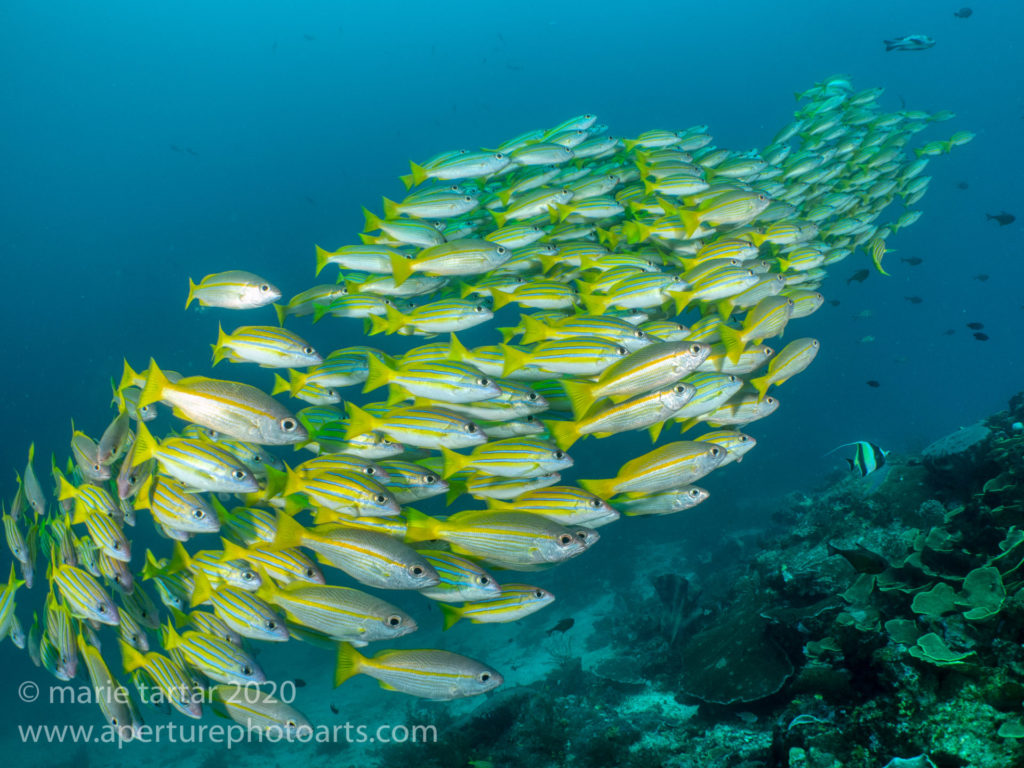

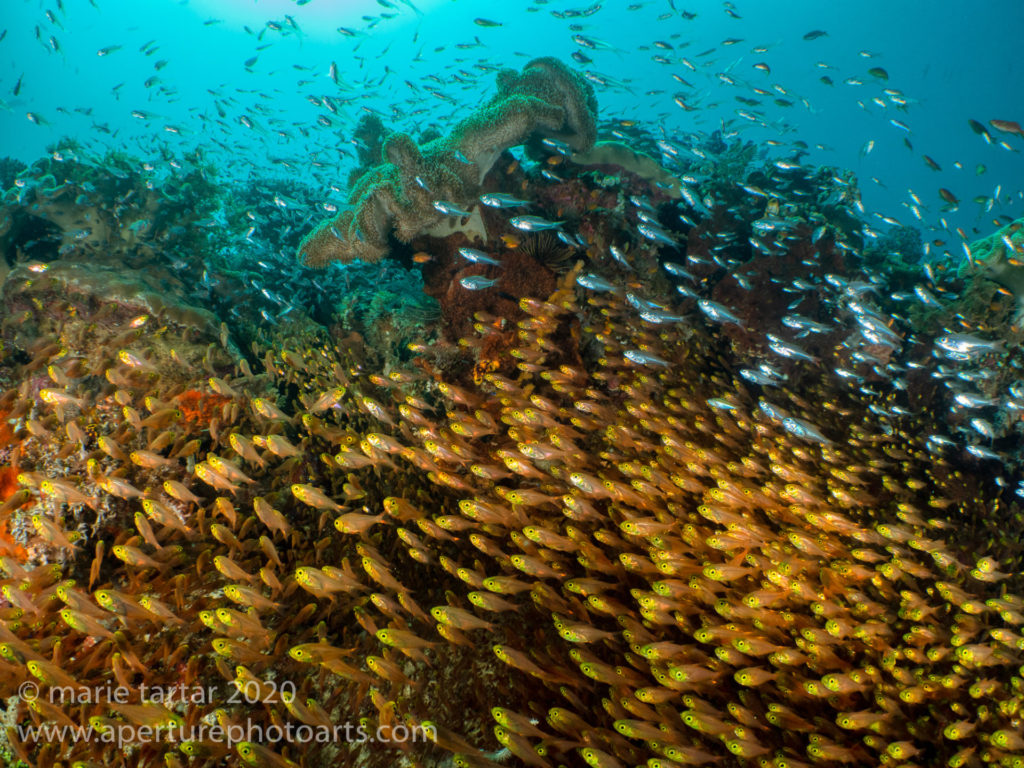
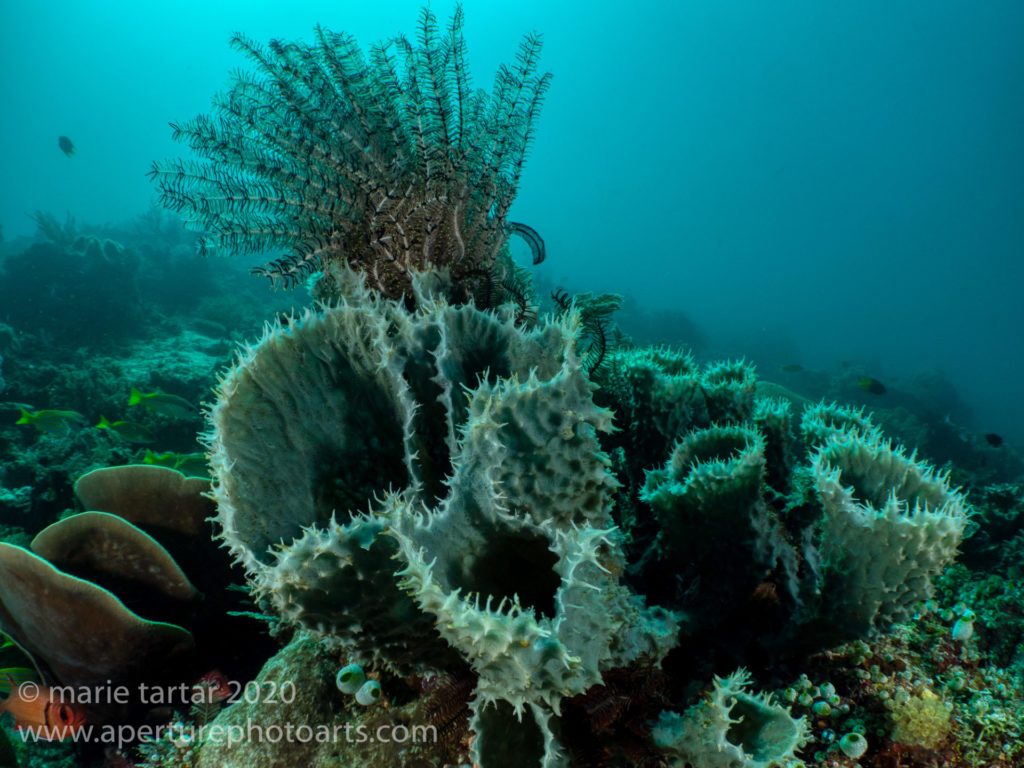


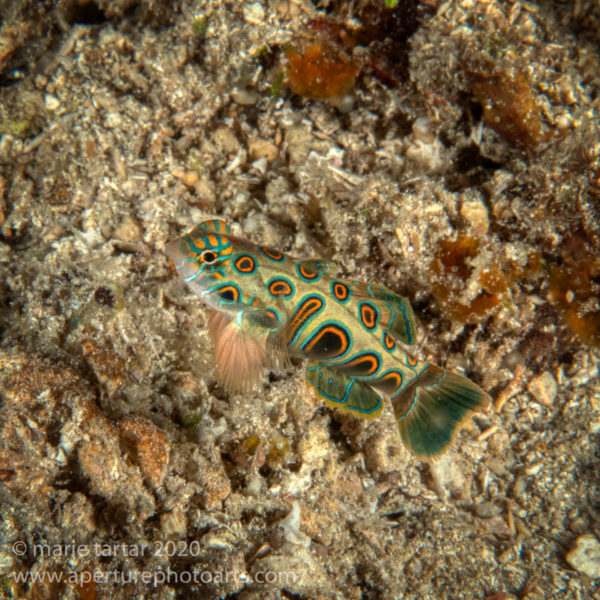
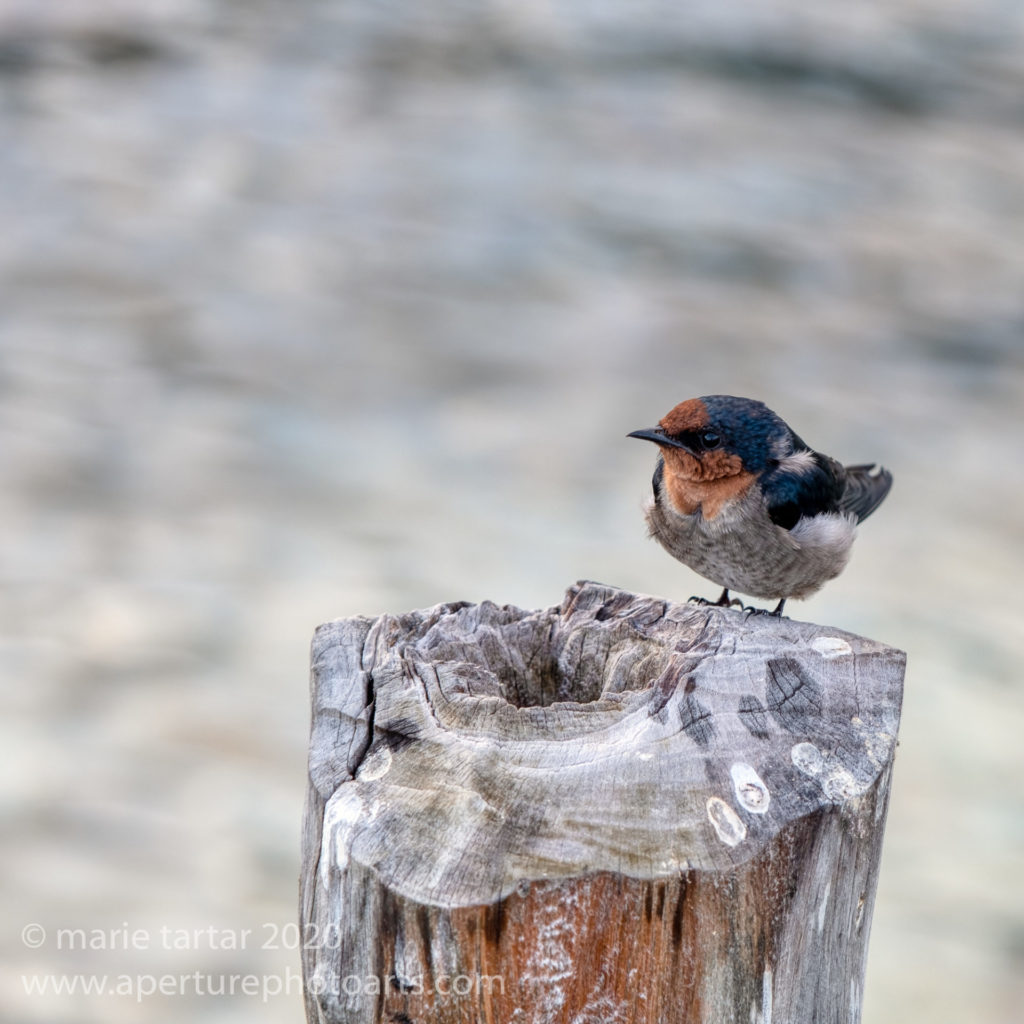
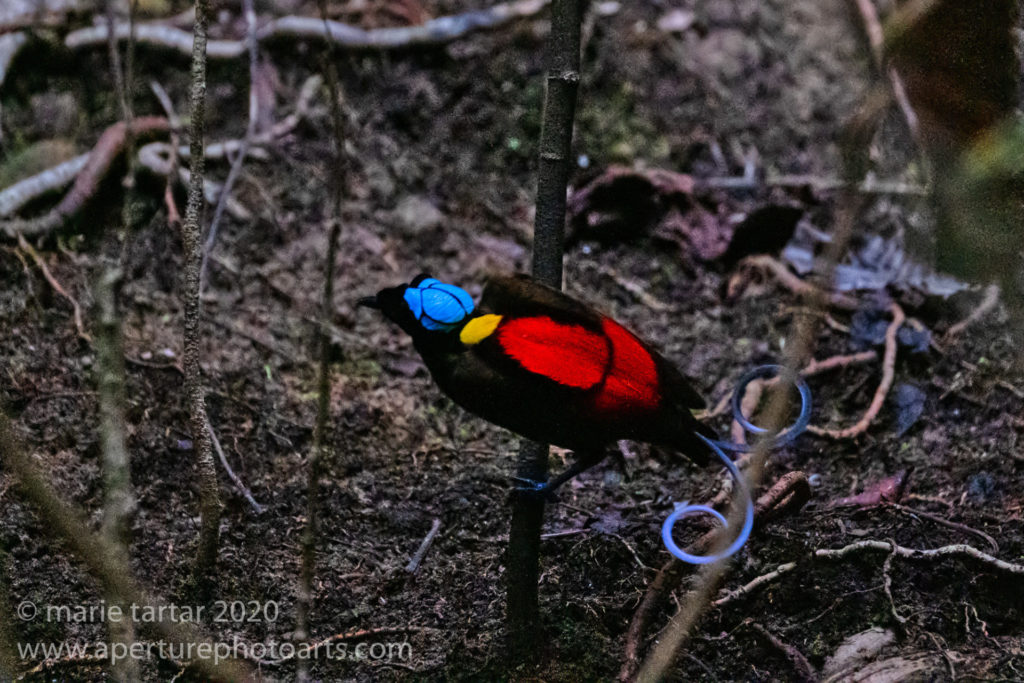
Marie –
What a wonderful recount of your experiences. Once again, thank you for joining our Island Exposure expedition. It was a pleasure to be out there with you and Steve, share these unique marine experiences and photographic subjects. We look forward to the next wild adventure with you!
As usual, a wonderfully rich and detailed account of some unforgettable diving. Your wide angle was lovely to behold after seeing mostly macro— R4 is definitely the right spot for that! So glad you got to perfect your mandarin hunting skills— and your manta videos rock!
I wish we could join you and Kate and Tanya in the Solomons later this spring!
-Marie
WOW !! Thank you for sharing- your photos are super and the recounting of the trip to see the Bird of Paradise Paradise was superb !! My wife and I were at Papua Paradise several months ago – we had to cancel our birding portion as we both had camera problems the night before. We will be going back next month but after reading your story, I’m not sure if we’ll try the “hike” this time. Thank you again for sharing
Hi Peter,
Lucky you, returning to PP so soon! I would encourage you to give the excursion a try! It was an adventure but the guides were very helpful in spotting us on the ascent and descent.
Best,
-Marie
Great shots! I recognize most of these dive sites. I remember the pier at Arborek especially. It looks like a great itinerary. I stayed at Gangga in 2016. How did you travel from Gangga to Cape Fri, etc?
Sounds like you needed a cardiologist on your flight. Or maybe just an early case of coronavirus.
Thanks for the gallery shots. I needed a break from the hospital this week. I’m covering the hospital and the ICU for the next several weeks. As you can image, the pandemic is not going well.
Take care,
Mark Etter
Hi Mark,
I know, the stress of working in the hospital is extreme these days and we are far from as front-line as you are, so we are cheering you on and hoping for the best. We did a couple of 3-tank day excursions to Cape Kri while staying at Papua Paradise.
We would gladly have ceded medical authority to almost any other kind of medical professional on that ill-fated flight. Believe me, I have replayed the events in my mind many times since then and of course, wondered if corona virus was in the differential diagnosis. I don’t think I mentioned but the very first action the JAL staff did when we arrived at the patient’s seat was to hand us both surgical masks and gloves. The argument against it being corona was that the patient had been traveling in the US for nearly a month, including multiple flights, and there were hardly any cases in the US then. We were perfectly healthy for our 3 weeks in Raja and for another 2 weeks afterwards back in the US, before both coming down with influenza A.
Stay safe,
Marie